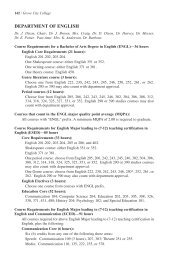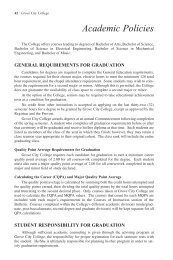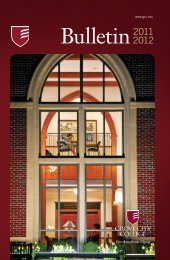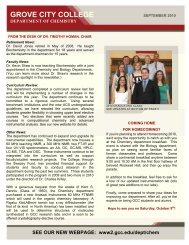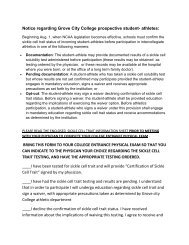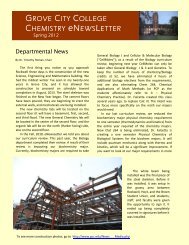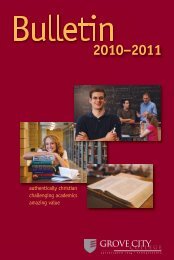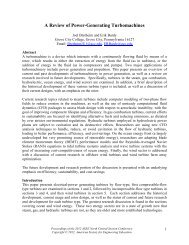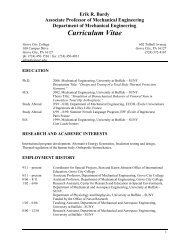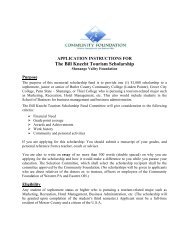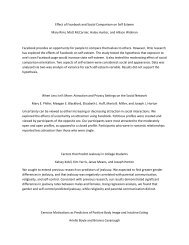2009–2010 - Grove City College
2009–2010 - Grove City College
2009–2010 - Grove City College
Create successful ePaper yourself
Turn your PDF publications into a flip-book with our unique Google optimized e-Paper software.
122 / <strong>Grove</strong> <strong>City</strong> <strong>College</strong><br />
Senior Year – The integrated design experience in ECE at <strong>Grove</strong> <strong>City</strong> <strong>College</strong> culminates<br />
in the senior year with the Senior Experience in Electrical Design (SEED). The SEED<br />
program is a capstone design experience comprised of a combination of research and proposal<br />
writing in Electrical Engineering Design (ELEE 401) in the fall semester of the senior<br />
year and hands-on implementation and documentation of that design in Experimental<br />
Electrical Engineering (ELEE 452) in the spring semester. The project must incorporate one<br />
or more advanced topics chosen from the senior-level stem sequences in Communication<br />
Systems, Computer Systems, or Control Systems (students choosing the CE concentration<br />
must include the Computer Systems Sequence). Since stem courses build on fundamentals<br />
presented in previous ECE courses, the SEED program assures that all ECE graduates complete<br />
a major design experience drawing on fundamental concepts as well as advanced ECE<br />
topics. While seniors are asked to present various oral and written updates throughout the<br />
SEED experience, the climax of SEED comes in the second semester of the senior year<br />
when students present oral and written reports to engineering professionals from nearby<br />
industries who judge the teams on various aspects of their designs.<br />
Course Requirements for Bachelor of Science Degree in Electrical Engineering<br />
(ELEE)<br />
Electrical Engineering/Computer Core (28 hours)<br />
Computer Science 141.<br />
Electrical Engineering 201, 204, 238, 251, 252, 301, 321, 351, 401, 451, and 452.<br />
Engineering Core (5 hours)<br />
Engineering 156 and 402.<br />
Math/Science Core (33 hours)<br />
Chemistry 105.<br />
Mathematics 161, 162, 261, and 262.<br />
Engineering 274*.<br />
Physics 101 and 102.<br />
Math/science elective—choose one course from the following:<br />
Biology 101, 102; Chemistry 227, 241, 345; Mathematics 213**, 222, 331; Physics<br />
232, 234; Astronomy 206, 207.<br />
*Students who take Mathematics 213 and also Mathematics 222 and 331, are exempt from<br />
the Engineering 274 requirement.<br />
** Students cannot receive credit for both Math 211 and Math 213.<br />
Concentration Area (37 hours) —choose one:<br />
Electrical Engineering Concentration (EEEE)<br />
Electrical Engineering 202, 302, 303, 304, and 352 (13 hours).<br />
Intermediate electives** (6 hours):<br />
Choose two courses from Computer Science 220, 222, 342, 450, Electrical<br />
Engineering 306, 310, 390, Engineering 390, or choose one course from this list and<br />
one additional course from the math/science electives.<br />
Advanced electives** (18 hours):<br />
Eight hours from Electrical Engineering 422, 432, or 442.<br />
Ten hours from Electrical Engineering 390, 404, 421, 431, 441, 499,<br />
or Engineering 390.<br />
**No course can be used to satisfy both the intermediate and advanced elective requirements.



